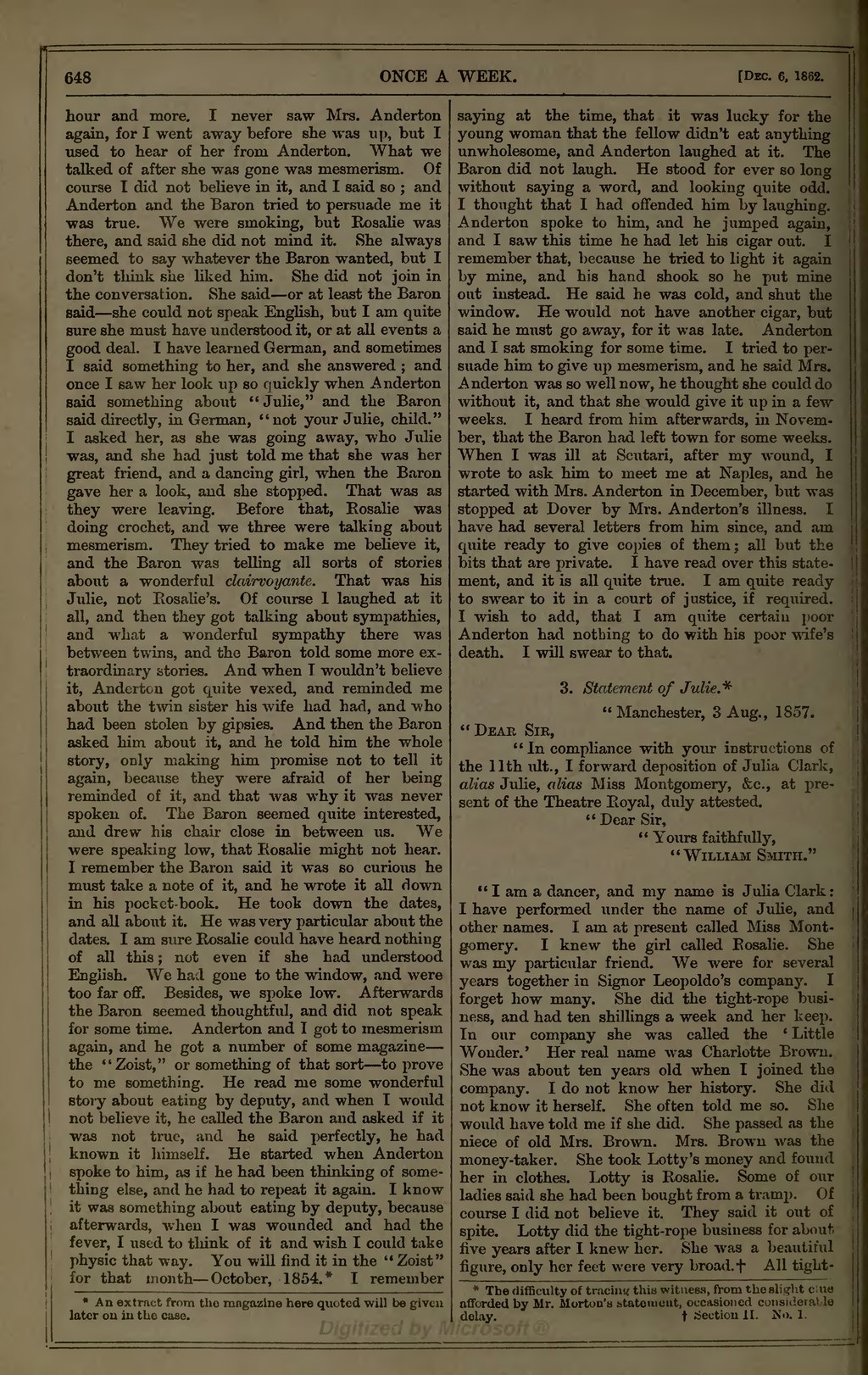hour and more. I never saw Mrs. Anderton again, for I went away before she was up, but I used to hear of her from Anderton. What we talked of after she was gone was mesmerism. Of course I did not believe in it, and I said so; and Anderton and the Baron tried to persuade me it was true. We were smoking, but Rosalie was there, and said she did not mind it. She always seemed to say whatever the Baron wanted, but I don’t think she liked him. She did not join in the conversation. She said—or at least the Baron said—she could not speak English, but I am quite sure she must have understood it, or at all events a good deal. I have learned German, and sometimes I said something to her, and she answered; and once I saw her look up so quickly when Anderton said something about “Julie,” and the Baron said directly, in German, “not your Julie, child.” I asked her, as she was going away, who Julie was, and she had just told me that she was her great friend, and a dancing girl, when the Baron gave her a look, and she stopped. That was as they were leaving. Before that, Rosalie was doing crochet, and we three were talking about mesmerism. They tried to make me believe it, and the Baron was telling all sorts of stories about a wonderful clairvoyante. That was his Julie, not Rosalie’s. Of course I laughed at it all, and then they got talking about sympathies, and what a wonderful sympathy there was between twins, and the Baron told some more extraordinary stories. And when I wouldn’t believe it, Anderton got quite vexed, and reminded me about the twin sister his wife had had, and who had been stolen by gipsies. And then the Baron asked him about it, and he told him the whole story, only making him promise not to tell it again, because they were afraid of her being reminded of it, and that was why it was never spoken of. The Baron seemed quite interested, and drew his chair close in between us. We were speaking low, that Rosalie might not hear. I remember the Baron said it was so curious he must take a note of it, and he wrote it all down in his pocket-book. He took down the dates, and all about it. He was very particular about the dates. I am sure Rosalie could have heard nothing of all this; not even if she had understood English. We had gone to the window, and were too far off. Besides, we spoke low. Afterwards the Baron seemed thoughtful, and did not speak for some time. Anderton and I got to mesmerism again, and he got a number of some magazine—the “Zoist,” or something of that sort—to prove to me something. He read me some wonderful story about eating by deputy, and when I would not believe it, he called the Baron and asked if it was not true, and he said perfectly, he had known it himself. He started when Anderton spoke to him, as if he had been thinking of something else, and he had to repeat it again. I know it was something about eating by deputy, because afterwards, when I was wounded and had the fever, I used to think of it and wish I could take physic that way. You will find it in the “Zoist” for that month—October, 1854.[1] I remember saying at the time, that it was lucky for the young woman that the fellow didn’t eat anything unwholesome, and Anderton laughed at it. The Baron did not laugh. He stood for ever so long without saying a word, and looking quite odd. I thought that I had offended him by laughing. Anderton spoke to him, and he jumped again, and I saw this time he had let his cigar out. I remember that, because he tried to light it again by mine, and his hand shook so he put mine out instead. He said he was cold, and shut the window. He would not have another cigar, but said he must go away, for it was late. Anderton and I sat smoking for some time. I tried to persuade him to give up mesmerism, and he said Mrs. Anderton was so well now, he thought she could do without it, and that she would give it up in a few weeks. I heard from him afterwards, in November, that the Baron had left town for some weeks. When I was ill at Scutari, after my wound, I wrote to ask him to meet me at Naples, and he started with Mrs. Anderton in December, but was stopped at Dover by Mrs. Anderton’s illness. I have had several letters from him since, and am quite ready to give copies of them; all but the bits that are private. I have read over this statement, and it is all quite true. I am quite ready to swear to it in a court of justice, if required. I wish to add, that I am quite certain poor Anderton had nothing to do with his poor wife’s death. I will swear to that.
3. Statement of Julie.[2]
“Manchester, 3 Aug., 1857.
“Dear Sir,
“In compliance with your instructions of the 11th ult., I forward deposition of Julia Clark, alias Julie, alias Miss Montgomery, &c., at present of the Theatre Royal, duly attested.
“Dear Sir,
“Yours faithfully,
“William Smith.”
